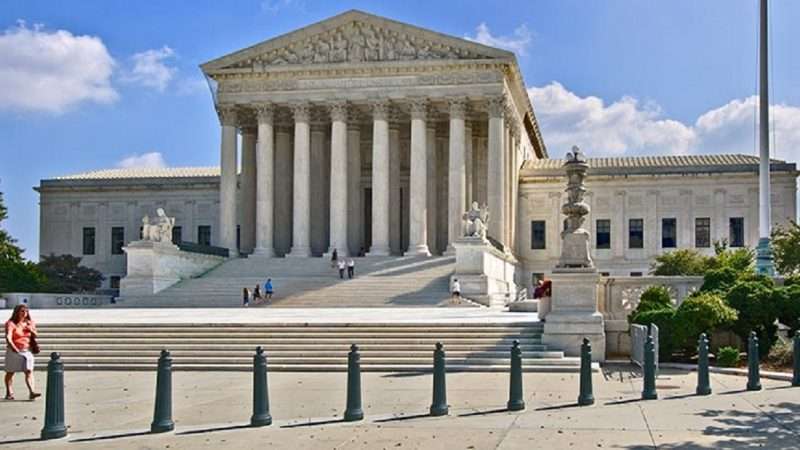
[The Firearms Policy Coalition amicus brief offers a simple and effective way to neuter the threat to judicial review posed by SB 8.]

The Supreme Court is about to hear Whole Woman's Health v. Jackson, one of two cases filed against Texas' SB 8 anti-abortion law that are currently before the justices. The case focuses on the procedural issue of whether abortion providers and others can challenge the law in federal court, given that all enforcement is delegated to private "bounty hunter" litigants, who stand to get awards of $10,000 or more if they prevail. Current Supreme Court precedent usually requires plaintiffs filing a pre-enforcement lawsuit against a state government for violating constitutional rights to target a specific set of officials who can be enjoined by the court. In this case, it initially appears there are no such potential defendants, because no state official is allowed to enforce the law.
For reasons I summarized in an earlier post about the SB 8 litigation, if this subterfuge is allowed to stand, it would create a road map for avoiding judicial review for other state violations of constitutional rights. Simply confine enforcement to private litigants, and you're good to go!
Fortunately, an amicus brief filed by the Firearms Policy Coalition (which got involved because of the potential threat to Second Amendment rights), offers a simple way to resolve the problem (see also Jonathan Adler's post about the brief):
Laws that deter or chill the exercise of constitutional rights violate those rights. Such deterrence or chill constitutes a present harm for which litigants can seek present redress without having to absorb the tremendous costs and risks of putting their heads on the proverbial chopping block by violating those laws and hoping for eventual vindication. Even where the risk derives from prospective litigation initiated by private parties invoking state law, such risks are still the product of state action in adopting and implementing the law. Whether the relevant state actors are the "deputized" potential plaintiffs and/or the court officials and jurists that wield the power of government at every stage of the litigation process, the chilling of protected conduct is the consequence of invoking state power to such ends, wholly apart from the outcome in any particular case. Indeed, the Texas law is designed precisely to have that effect, biasing the playing field in a manner that likely violates due process, the right to petition, and various other provisions of the Constitution wholly apart from its restriction on abortion. In such circumstances, there should be no serious barrier to enjoining any and all state actors or agents who facilitate or play a role in such a farce.
For purposes of dealing with laws like SB 8, state courts and private litigants "deputized" to enforce the law can be considered state actors, and therefore subject to injunction. State courts are no less bound by the federal Constitution than other state government employees, and should be no less subject to injunction when they violate constitutional rights - or threaten to do so.
I would go a step further than the FPC brief and suggest that, when faced with something like SB 8, a federal court should simply be able to enjoin the state government as a whole, rather than focus on a specific set of officials (or "deputized" private litigants). As explained in my previous post on SB 8:
Even if we do not know which individuals, if any, plan to enforce an unconstitutional law, or have the authority to do so, a court should be able to issue a general injunction precluding enforcement of that law by anyone who might otherwise be in a position to undertake that task.
If it turns out that no one is willing or able to enforce it, then the injunction will be unnecessary, but also won't do any harm; it would, in that scenario, forbid something no one was going to do anyway. But such a general injunction could play a valuable role in forestalling violations of constitutional rights in situations where it is difficult to predict in advance who the violators will be.
The FPC brief highlights a reason why this approach is consistent with the text of the Fourteenth Amendment. It follows logically from the text of the Privileges or Immunities Clause:
[T]he Fourteenth Amendment would seem to supersede any previous potential state sovereign immunity as against violations of the federal Constitution. Looking at the Privileges or Immunities Clause, for example, a State may not "make or enforce any law which shall abridge the privileges or immunities of citizens of the United
States." U.S. CONST., amend. XIV.
Notice that the text forbids "making" laws that abridge privileges or immunities of citizens, as well as "enforcing" them. The entity that makes the laws is the state legislature, and this provision opens the door to injunctions that do whatever is necessary to render any such unconstitutional enactments null and void. As the FPC brief points out, many conservatives, including Supreme Court justices Thomas and Gorsuch have long argued that the Privileges or Immunities Clause is the right vehicle for "incorporating" the Bill of Rights against the states. And other rights protected by the Fourteenth Amendment (including any constitutional right to abortion) also surely qualify as privileges or immunities for enforcement purposes.
The most obvious criticism of this approach is that it would open up states to a variety of potentially frivolous lawsuits. Perhaps so. But federal courts have a variety of tools for swiftly disposing of frivolous suits, including using Federal Rule of Civil Procedure 12(b)(6), which allows dismissal of a complaint for "failure to state a claim upon which relief can be granted." Judges don't need to tolerate assaults on judicial SB 8 in order to prevent frivolous litigation.
The FPC brief is also notable for its succinct and powerful summary of why preenforcement challenges to laws violating constitutional rights are so important (see pp. 4-10 of the brief). As it points out (pp. 9-10), SB 8's structure may make it even more of a menace than other laws intended to "chill" the exercise of a constitutional right.
In my previous post on this case, I emphasized that my critique of SB 8 is not about the issue of whether Roe v. Wade should be overruled or limited, or whether there is a genuine constitutional right to abortion. Rather, my concern is preventing SB 8 from creating a dangerous road map for undermining judicial protection of a wide range of constitutional rights:
My strategy would not preclude the Supreme Court (or other courts) from simply ruling against abortion rights (or other constitutional rights claims) on the merits. If the Court wants to overrule Roe v. Wade because a majority of justices think it's a terrible decision, they can still do so. The same goes for Citizens United, decisions protecting gun rights, and so on. The purpose of my proposal is not to freeze any particular precedent in place, but to forestall the use of private enforcement mechanisms as a tool for evading judicial review of laws that threaten constitutional rights, and in the process creating dangerous "chilling effects."
That's a goal worth pursuing regardless of what you think of Roe v. Wade and abortion rights. Even if you welcome Texas' circumvention of Roe, you might not be so happy to see the same tools used to threaten constitutional rights you care about more.
UPDATE: I should note this approach will not resolve the companion case of United States v. Texas, which addresses the question of whether the federal government is allowed to file a lawsuit challenging SB 8. But that case becomes far less important if the Whole Woman's Health case is resolved in the way described above. Whether the federal government can file preenforcement lawsuits in such cases matters less if there are a wide range of private parties who can do so.
No comments:
Post a Comment